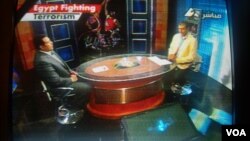CAIRO —
"Anybody who is elected in a democratic election automatically becomes a good guy and a democrat. And anybody who stages a coup d'etat against a democratically elected president is automatically a bad guy," he noted. "But the closer people are to the story, the less simplicity there seems to be to it, the less quick to judgment people are.”
In Egypt's turmoil in recent weeks, the media has been a battleground -- with newspapers and television stations sympathetic to the deposed president shut down, and remaining outlets complying with the new government. Meanwhile, foreign news organizations have come under sharp criticism from the government, and many of their reporters have faced anger, and even assault, on the streets.
At one of the many protests in recent weeks, supporters of ousted president Mohamed Morsi chanted for the establishment of Islamic Shariah Law in Egypt -- a central goal of the Muslim Brotherhood, but one that was not the official policy of the now deposed government it supported.
Still, that is exactly what many Egyptians feared, and a key reason so many supported the military takeover last month.
That included shuttering television stations and newspapers that supported former president Mohamed Morsi, leading one protester to defiantly tell the Reuters news agency the movement will prevail even without its media arms.
“The media suppression and cover-up they are doing is not going to do them any good," the protester warned. "We are a people who will not accept being pushed. No matter how much you push against us, no matter how many you kill, we will continue to the end.”
Social media has taken up some of the slack, providing a way to organize protests and publicize the Brotherhood's views. But the mass media is firmly in the hands of the interim government installed by the military.
With a banner reading “Egypt Fighting Terrorism” continually at the top of the screen, the anchorman of the government's satellite channel greeted viewers for the evening newscast.
The news was all pro-government, and it played on people's fears of extremism, labeling all protesters as “terrorists” and implicitly linking them to the the killings of 25 Egyptian policemen in a desert ambush this week by suspected Islamist militiamen.
“There's no question that demonization is on its way," said Abdallah Schleifer, a former journalist and now professor emeritus of journalism at the American University in Cairo.
“But when the Morsi people had access to their own media, they were every bit as vituperative and intransigent," Schleifer added. "Anybody who was against Morsi when he was president was being described as a traitor, infidel. The language was equally vituperative.”
And Schleifer said the institutional changes Morsi was making to many aspects of Egyptian society had the potential to do more long-term harm than the current restrictions, which he describes as “transitional.”
His colleague at the university, Political Sociologist Said Sadek, said the Muslim Brotherhood has already been demonized, but not only by the media.
“People had experienced them first-hand, and they began to feel they are a danger," Sadek said. "And this is what I had been warning the Muslim Brotherhood long ago -- if you continue your policy you will have the people against you, not only the state, not the institutions, the people.”
It is a powerful combination -- the experience of a year of Islamist rule and the now constant drumbeat of media criticism.
And it has caused something of a backlash in the western press, with many foreign reporters tending to oppose military takeovers and the information campaigns that come with them, and sympathizing with the hundreds of civilian casualties from the past week's crackdown.
The interim government accuses the western media of presenting a “distorted image” of Egypt, that “is far from the facts, biased” toward the Muslim Brotherhood and ignores its violent excesses. Credential applications from new arrivals are being delayed for 'security checks.'
“They're shallow and naïve in this sense -- we have a mindset," said professor Schleifer, an American who has spent decades in Egypt, referring to much of the foreign coverage.
"Anybody who is elected in a democratic election automatically becomes a good guy and a democrat. And anybody who stages a coup d'etat against a democratically elected president is automatically a bad guy," he noted. "But the closer people are to the story, the less simplicity there seems to be to it, the less quick to judgment people are.”
It is an age-old question whether those who are deep in the details of a situation are the best judges of it, or whether those who come from afar have the better perspective.
And the dispute is likely to go on, with the interim government showing no sign of backing down from its takeover, its crackdown or its media policy.












